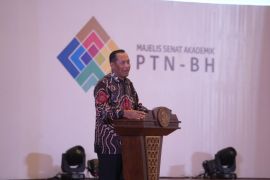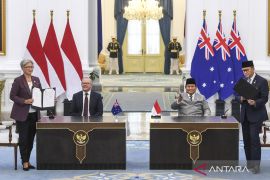"If Indonesia can sustain its current rate of growth and development, we can be the sixth or seventh largest economy in the world," Finance Minister Agus Martowardojo said.Jakarta (ANTARA News) - Finance Minister Agus Martowardojo has said that Indonesia`s economy could be one of the seven greatest in the world by improving its human resource productivity and efficiency in the energy sector.
"If Indonesia can sustain its current rate of growth and development, we can be the sixth or seventh largest economy in the world," he said here on Tuesday.
Agus said that the challenges faced by the government are to realize its energy management, improving the quality of human resources and the productivity in the agricultural sector.
"The challenges lie to improve in the three main sectors, for better energy management, to improve management of human resources, with particular expertise on balance and to increase and improve productivity in the agricultural sector," he said.
Earlier, Chairman of McKinsey Indonesia, Raoul Oberman predicted that Indonesia could be among the seven largest global economies by 2030, leaving behind Germany and the UK, in the process.
"By significantly increasing its productivity, Indonesia is increasingly being taken into greater account at the global level," he said.
Raoul said that Indonesia`s economic growth will continue to benefit from a number of strong trends, such as the increase of its middle class population to about 90 million people.
"Apart from China and India, the growth of the middle class in Indonesia is higher than any other country in the world. This is a positive signal to businesses and investors for many new promising opportunities," said Raoul.
In 15 years, the global consumer class is estimated to reach 1.8 billion people, the majority of which are in Asia. As a result, the demand for resources and commodities in Indonesia will only increase.
Therefore, Indonesia needs to increase its labour productivity by 4.6 percent or needs to take the figure 60 percent higher than the productivity average in the last decade.
"Indonesia also needs to address the issue of social inequality and manage surging demand due to rising numbers in the consumer class, in order to meet the target growth in gross domestic (GDP) in the long term," he added.(*)
Editor: Heru Purwanto
Copyright © ANTARA 2012












